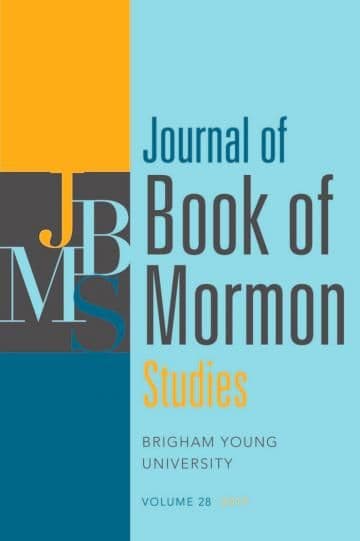Journal
Out of the Dust: Ancient Steel Sword Unearthed

Title
Out of the Dust: Ancient Steel Sword Unearthed
Publication Type
Journal Article
Year of Publication
2005
Editors
Brown, S. Kent (Secondary)
Journal
Journal of Book of Mormon Studies
Pagination
64-65
Volume
14
Issue
2
Abstract
A short sword was unearthed in the ancient Philistine city Ekron, which was destroyed in 604 B.C. and lay twenty-two miles south of Jerusalem. Israel seems to have been initially dependent on the Philistines for metallurgy. In 2003, a seventh-century bc Etruscan gold book was discovered in Bulgaria. Recently, another gold book was found in Iran dating from around the sixth century B.C.
Out of the Dust
Ancient Steel Sword Unearthed
The November/December 2005 issue of Biblical Archaeology Review contains a summary of the final reports of excavation work at biblical Ekron (see Seymour Gitin, “Excavating Ekron: Major Philistine City Survived by Absorbing Other Cultures,” 40–56).
Ekron, located only some 22 miles south of Jerusalem, was last destroyed by Nebuchadnezzar in 604 BC. Thus it predates the Book of Mormon record. Of special interest is an ivory-handled “dagger” or short sword. By the size of the adult hand holding it (see the accompanying photo), the blade is 12 to 16 inches in length. This metal must technically be described as steel rather than iron. Smelting anciently relied upon charcoal, which infused substantial amounts of carbon into the iron as the ore was smelted and the bloom was worked, producing a carbon steel. (Compare 1 Nephi 4:9, although “most precious” here might well indicate meteoric iron/nickel. Forged steel was more common in the ancient Near East in general and in Israel by Lehi’s time than many have imagined.)
While at one time Israelites apparently were restricted from or dependent upon the Philistines for iron tools (see 1 Samuel 13:19–22), attempts to maintain such a monopoly over technologies such as iron metallurgy inevitably gave way through the process of cultural diffusion. The article’s author acknowledges that such cultural processes existed between Philistine and Israelite communities:
There is no evidence that olive oil had been produced at Ekron prior to the seventh century B.C.E., indicating that the industrial know-how had to be imported. The most obvious source was Ekron’s neighbor Judah, where the technology for producing olive oil had been well known for centuries. As we have come to expect, Ekron Philistines absorbed their olive-oil production expertise from their neighbor but adapted it to their own methods, thereby developing a new economic culture. (pp. 53–54)
Reported by Gordon C. Thomasson
Another Gold Book Found
In October 2005, police in Tehran, the capital of Iran, recovered a number of artifacts that a farmer had found while plowing a field and then had sold to smugglers. Among the objects was a book comprising eight gold sheets inscribed in cuneiform script, which was used in much of the ancient Near East. The sheets were bound by four small rings passing through holes in the sheets, in the same fashion as an ancient Etruscan gold book found in Bulgaria in 2003 (see “Etruscan Gold Book from 600 BC Discovered,” Insights 23/5, 2003) and the plates of the Book of Mormon (see the description in History of the Church, 4:537).
The book is from the Achaemenid period, which began in the mid-sixth century bc. One of its most prominent rulers was Cyrus the Great, who conquered the Babylonian Empire in 539 BC and allowed the Jews taken captive by the Babylonians to return home two years later. The Etruscan book has been dated to the time of Lehi, circa 600 BC. For a report on this latest find, go to http://www.cais-soas.com/News/2005/October2005/11-10.htm (accessed 21 February 2006).
Subject Keywords
Bibliographic Citation
Terms of use
Items in the BMC Archive are made publicly available for non-commercial, private use. Inclusion within the BMC Archive does not imply endorsement. Items do not represent the official views of The Church of Jesus Christ of Latter-day Saints or of Book of Mormon Central.